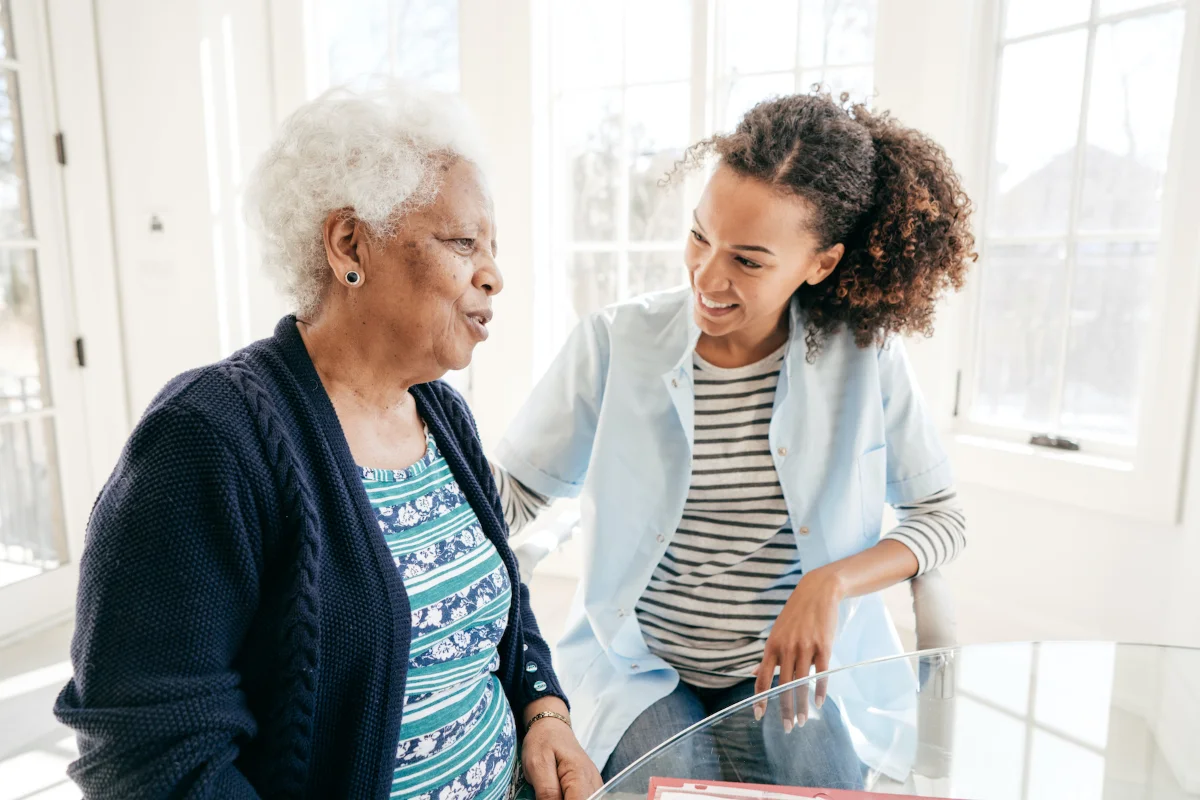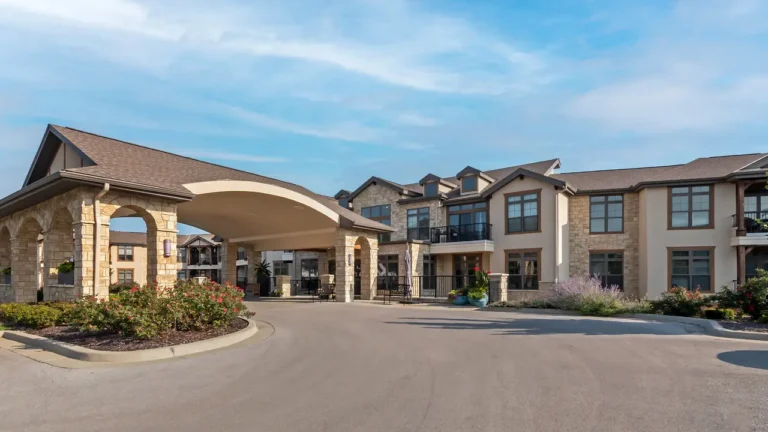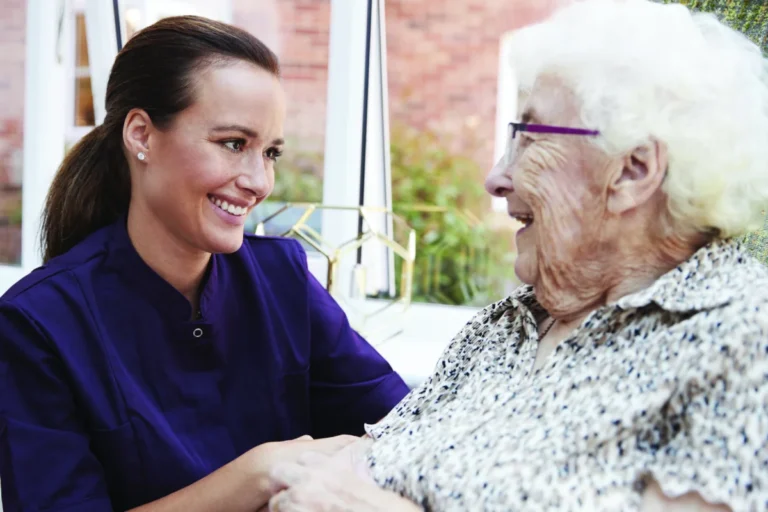Dementia is the progression of cognitive impairment of the brain, which results in memory loss and affects processing of information as well as problems with language, including remembering words and articulating them. It is important to ensure compassionate communication with the memory impaired, including staying patient and taking verbal and nonverbal cues from your loved one when conversing.
Other language issues, such as repeating words or having difficulty following sentence and grammar structure, can be one of the earliest signs and effects of dementia. Emotions can also be heightened by dementia, and increasing feelings of frustration can hinder communication. Because of these challenges and obstacles, individuals with dementia can often feel isolated or disjointed from friends and family because they can no longer communicate clearly with them.
As cognitive wellness declines, conversations can become gradually harder with someone who has dementia. In every stage of dementia, prepare yourself to adapt as capabilities change as the disease progresses. Patience and empathy are crucially important when speaking to someone with dementia.
Daily communication can be difficult, and strategies are based on individual needs. Here are three tips to keep your communication flowing with someone with dementia:
- Stay in the present. Avoid talking about the past or the future as these may be topics that are not easily grasped during the stages of dementia.
- Speak clearly with simple and concrete statements as this makes it easier for those with dementia to process your sentences and intent.
- Reassure your loved one with eye contact and nonverbal cues, such as hand-holding, to show that you are engaged with what they have to say.
During this time, work with caregivers and doctors to create an individualized care plan to help mitigate some of these struggles. If you are caring for your loved one at home, it may be time to seek out a memory care community for more hands-on support and security. The benefits of memory care are endless and can help greatly improve quality of life as the disease progresses.
Dementia Communication Difficulties by Stage
How to communicate with someone who has early-stage dementia:
In the early stages of dementia, individuals may have issues finding the right words they want to say, forget facts and find themselves confused in everyday situations. As cognitive wellness decreases, communication support is extremely important to help navigate these challenges.
Note that this is a very confusing time for someone who has lived their life independently. Individuals may feel like they are losing their sense of identity and feel frustrated that they are not able to communicate the way they have in the past. Compassionate memory care, by family or outside caregivers, is truly important at this time to help maintain a sense of identity for as long as possible.
During early- and middle-stage dementia, art and music therapy can be very beneficial for communication. While the individual may not be able to verbally communicate like they have in the past, music and art can help them express themselves in new and helpful ways.
Being able to express emotions, thoughts and feelings will help reduce frustration and encourage seniors’ independence. While individual needs will vary, feeling empowered to be heard by others will help seniors live independently for longer, allowing them to make choices for themselves.
During communication support, resist the urge to correct your loved one or argue with them about topics that may come up. Individuals with dementia have more issues processing facts now than they have in the past, and as cognitive impairment progresses, facts are fluid and memories may change. Arguing may increase agitation and confusion and make the visit and communication uncomfortable for both you and your loved one.
How to communicate with someone who has middle-stage dementia:
As dementia progresses, verbal expression and daily communication will start to feel disorienting. Seniors with dementia may ask repeated questions or voice their confusion about topics that they are thinking about. Simple communication is key here.
Speak slowly and clearly with simple communication and in a quiet space to minimize distractions. Ask simple, clear questions – many people use yes/no questions to communicate at this stage. Be respectful in your communication, and continue to treat your loved one with autonomy – they are capable and interested in maintaining verbal communication to the best of their ability.
Give choices instead of asking open-ended questions for seniors with dementia. Instead of asking “What would you like to eat for dinner?” rephrase your question to give two options, such as “Would you like mashed potatoes or vegetables as a side dish tonight?”
Stay attuned to your own emotions while you are speaking to a senior with dementia. Loved ones can pick up on your emotional state, and it may agitate or confuse someone further while trying to communicate with you.
How to communicate with someone who has late-stage dementia:
During the later stages of dementia, verbal communication will become increasingly more difficult. It is more important than ever to reassure your loved one with verbal and nonverbal communication to convey your emotions and thoughts.
During this stage, simplifying your communication is crucial to engaging your loved one. Ask yes or no questions, and be patient when waiting for an answer. If you are on the phone, take time for your loved one to respond before asking another question. If you are in person, pay attention to individuals’ nonverbal cues, such as smiles and eye contact, to maintain connection.
Plan your visit according to what time is best for your loved one. Some people may react better to visits in the morning, but some may enjoy afternoon visits better.
What Kind of Sensory Activities Are Good to Connect With Someone Who Has Dementia?
- Touch: Rubbing your loved one’s back, holding hands or hugging can help bring connection to someone with dementia. Massaging your loved one’s hands or feet is a soothing activity that will help them relax.
- Tactile items: Soft socks and plush blankets are optimal for bringing comfort to the senses.
- Comforting sounds: Music can be utilized throughout all stages of dementia. Try different types of music, from nostalgic tunes to classical ballads to white noise to see how different types of sounds can calm nerves and bring peace to the mind.
- Aromatherapy: Using a variety of scents from candles, essential oils and lotions can help bring a sense of calm to someone with dementia.
- Taste: Eating will eventually become difficult for a senior with dementia, so offer soft versions of foods they love. Bringing joy through their favorite meal can bring comfort. Be careful to avoid choking hazards.
Support With Thrive in the Courtyard Memory Care
The Thrive in the Courtyard Memory Care Program, exclusive to Tutera senior living communities, combines proven treatment methods of dementia into a comprehensive program that improves seniors’ quality of life and enhances mind, body and soul. The core of compassionate memory care is encouraging your loved one to maintain autonomy and independence as long as possible, and Thrive in the Courtyard helps this process by creating a comfortable environment.
When entering the Thrive in the Courtyard Memory Care Program, each new resident or family completes a YOUNITE life history survey to assess their unique personality and desired lifestyle. This forms the basis of a personalized care plan attuned to each senior’s needs, helping them live happier, more enriched lives.
In the Thrive in the Courtyard Memory Care Program, compassionate care meets watchful helpers, keeping memory care residents safe, secure and calm. Memory care communities seek to create a homelike, welcoming environment designed to be safe, yet familiar. Each has its own selection of services, amenities and memory care programming to ensure more good days.
While in the Thrive in the Courtyard Memory Care Program, residents are supported by a network of nurses, caregivers, chefs and other care experts. The team gets to know your loved one – interests, hobbies, likes and dislikes – and offers engaging activities to bring more joy to life. This stable environment gives more peace of mind to those with dementia and their families.
About Tutera Senior Living & Health Care
No matter which stage of dementia your loved one is in, compassionate communication with the memory impaired is possible. Starting with simple communication, you can assist cognitive wellness through a variety of methods and actions. Living in a memory care community can help ease the effects of the disease while bringing peace of mind to residents and their families.
The Tutera Thrive in the Courtyard Memory Care Program is available in many cities nationwide. To learn more about senior living community options in your area, use our community finder tool. Have questions? Our Tutera team is here to help you navigate this journey. Contact us today and we’ll help you get started.







